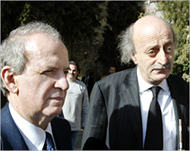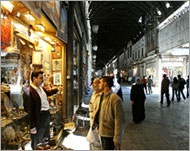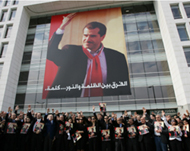Al-Sharaa remark angers Hariri allies
A Lebanese cabinet minister has urged a UN commission to summon Syria’s foreign minister for comments in which he suggested that the slain Lebanese statesman Rafiq al-Hariri had lied about being threatened by the Syrian president.

Marwan Hamadeh, Lebanon’s telecommunications minister, also said on Thursday that Farouk al-Sharaa, the Syrian official, should stand trial, accusing him of misleading the commission that is investigating al-Hariri’s assassination.
At a press conference on Wednesday, al-Sharaa had suggested al-Hariri lied to Lebanese politicians when he told them he was threatened by Bashar al-Assad, the Syrian president, at a meeting on 26 August 2004.
Al-Sharaa said al-Hariri “was unable to justify” his acceptance of the extension of Lahoud’s mandate and so he had claimed that he had been threatened by the Syrian president.
“This is my opinion,” he added.
Hamadeh accused al-Sharaa of trying to mislead the UN investigation and said the commission should summon him.
Bid to terrorise
“We warn about the continuous attempt to pressure and terrorise the international investigating committee,” Hamadeh said in a statement.
He said al-Sharaa and others in the Syrian government should be put “in the dock in an international tribunal”.
 |
|
Car-bomb survivor Hamadeh (L) |
Another leading politician, Walid Jumblatt, the political head of Lebanon’s Druze community, reacted to al-Sharaa’s remarks by saying the Syrian foreign minister was a “bully” and accusing Syria of sending “poisonous, corrupt and immoral messages”.
Several politicians have testified to the commission that they were told that when al-Assad informed al-Hariri of his decision to push for the extension of the Lebanese president’s mandate, al-Assad had allegedly threatened to “break Lebanon” over al-Hariri’s head if he did not support the decision.
The politicians, who include Hamadeh, said al-Hariri had told them of the meeting with al-Assad after he returned to Beirut from the Syrian capital that day.
Car bombing
Al-Hariri reluctantly voted for the three-year presidential extension of Emile Lahoud’s term in September 2004, but he resigned as prime minister a month later.
A few days before the resignation, Hamadeh survived an assassination attempt in a car bombing in Beirut.
|
“We warn about the continuous attempt to pressure and terrorise the international investigating committee” Marwan Hamadeh, |
Al-Hariri was tilting towards the anti-Syrian opposition in Lebanese politics when he was assassinated by a massive truck bombing on 14 February.
The UN commission has implicated top Lebanese and Syrian security officials in the murder – a charge Syria denies.
Meanwhile, John Bolton, US ambassador to the UN, has been quoted as predicting that the Security Council will take steps against Syria in the New Year for its failure to cooperate with the commission on al-Hariri’s killing.
On 15 December the Security Council had expressed its “extreme concern” that Syria had not provided “full and unconditional cooperation” with the commission – an accusation that Syria rejected.
Bolton interview
In an interview with the Arabic newspaper Asharq al-Awsat published on Thursday, Bolton said there had been no substantial change in Syria’s attitude towards the commission.
He said Syria must improve its cooperation otherwise “the Security Council will be ready at the appropriate time to take other measures”.
 |
|
Syria narrowly escaped sanctions |
“I think this is just a matter of time,” Bolton added. He said he expected the Security Council to discuss Syria early in 2006.
In Damascus on Thursday, some 1000 Syrians staged a sit-in outside the UN offices in protest against the international pressure on Syria.
Waving Syrian flags, the protesters delivered a letter addressed to Kofi Annan, the UN secretary-general, that said the commission’s findings were politicised and biased.
The protesters delivered a petition that supports the letter which had been signed by 3.2 million Syrians. The petition filled 16 boxes. It took a month to collect the signatures from across Syria, a country of 17 million people.
Initiative frozen
Meanwhile, Amr Moussa, the Arab League secretary-general, has frozen his initiative to improve relations between Lebanon and Syria till further notice.
 |
|
The killing of editor Gebran Tueni |
Speaking to Lebanon’s An-Nahar newspaper, he said the parallel Egyptian-Saudi initiative to defuse Syria-Lebanon tensions appears to be frozen as well.
Moussa has denied reports circulating in Lebanon that his initiative was aimed at closing the Hariri assassination case and putting a stop to Lebanese media attacks on Syria in exchange for an end to the campaign of assassination of anti-Syrian figures in Lebanon.
Separately, from Cairo, Abdul Ilah al-Khatib, the Jordanian foreign minister, said on Thursday that Arab foreign ministers have endorsed the idea of holding consultations with Syria and Lebanon on Arab efforts to mend fences between the two countries.